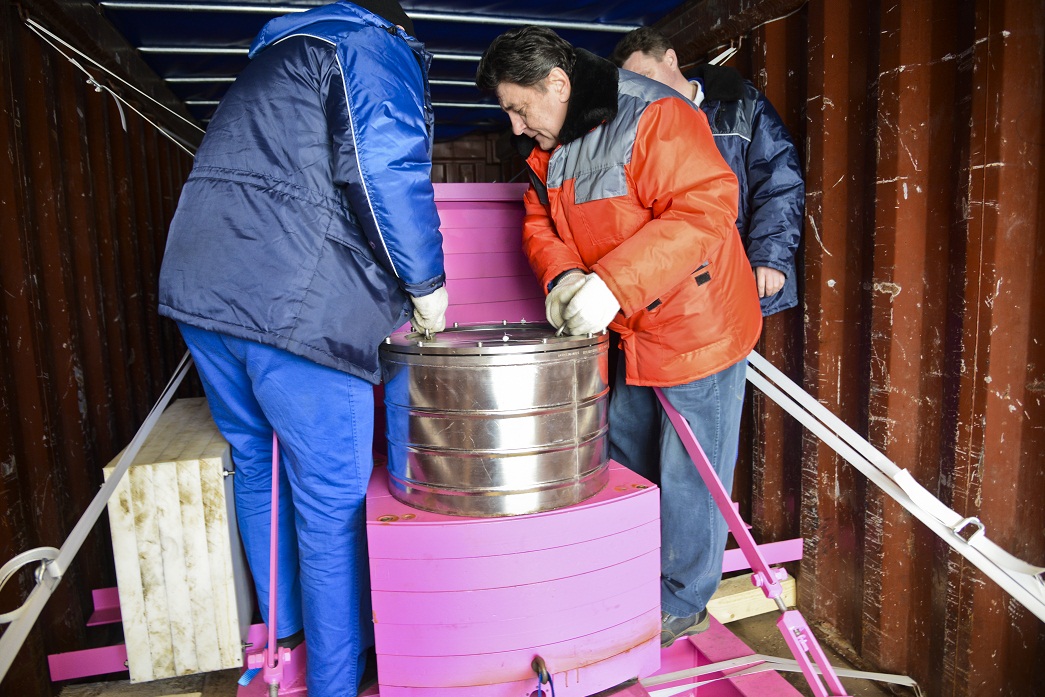
Second to None Competencies
back to contentsSeveral international collaborations are trying to find evidence of this reaction by using isotope-based detectors. One of those collaborating groups is GERDA (GERmanium Detector Array) experimenting with detectors made of highly pure germanium enriched with germanium-76 exclusively at the Electrochemical Plant (ECP, a subsidiary of Rosatom’s TVEL Fuel Company).
In the first phase, the experiment found no neutrinoless decay of germanium-76, but made certain progress towards the goal. At present, GERDA is preparing for the second phase. The researchers plan to substantially increase the sensitivity of the detection unit. As part of this plan, they held a meeting with representatives of Kurchatov Institute, Institute for Theoretical and Experimental Physics, TVEL, ECP and Izotop in 2016 to discuss the terms of germanium-76 supplies. ECP having the required experience and competencies was selected as a germanium-76 supplier. The isotope was shipped under the contract between Izotop, Rosatom’s isotope specialist, and the Max Planck Institute for Nuclear Physics.
“The Electrochemical Plant is one of the world’s largest producers of isotopes. Quality of its products has been repeatedly recognized by major testing laboratories,” said Dmitri Timofeev, Deputy Director for Isotope Production at ECP, in his interview to Rosatom Newsletter. “It is not the first time ECP has participated in the project. The first shipment of germanium-76 for the GERDA project was made in 2004–2005. It was back then we acquired the competencies required to store and transport this isotope. Just as in 2005, the quality of germanium powder was again appreciated by our partners. Unlike then, though, when we shipped only several kilograms of germanium-76, this batch amounts to as much as twenty kilos.”
According to Mr. Timofeev, germanium acts as both a source and a detector of target processes, achieving the maximum possible efficiency of particle registration. “The germanium-based detection unit is also compact and requires minimum construction materials, which is extremely important to maintain low background radiation.
High energy resolution typical of germanium detectors and innovative research methods developed by GERDA allow for lower natural background radiation, thus increasing sensitivity of the detector,” Mr. Timofeev said.
Unparalleled process
According to Maria Varlakova, Lead Sales Manager at ECP, production of germanium-76 is different from that of other isotopes. Since the isotope remains on the detector surface for a very limited period of time, the production technology must be strictly followed so as to ensure maximum protection against cosmic background radiation. “For this reason, we control each production stage and record all inventory flows in accordance with the procedure. Fabricated isotopes are stored in a special underground storage facility till the shipment,” she said.
“Special requirements are also set for the transportation of isotopes,” said Dmitry Timofeev. “A 15-ton TUK nuclear cask was used during the transportation for the same purpose as the underground storage facility – it protects germanium isotopes from cosmic radiation. The nuclear cask was produced at ECP in 2004 to transport the first batch of germanium-76. Later it was upgraded in accordance with the customer’s requirements to protect the material from external radiation.”
Thanks to well-coordinated manufacturing and logistic processes organized by ECP with the input from Izotop, the material was timely delivered to the customer. Tests on the customer’s site have confirmed that quality of the isotope is in compliance with the terms of the contract.




